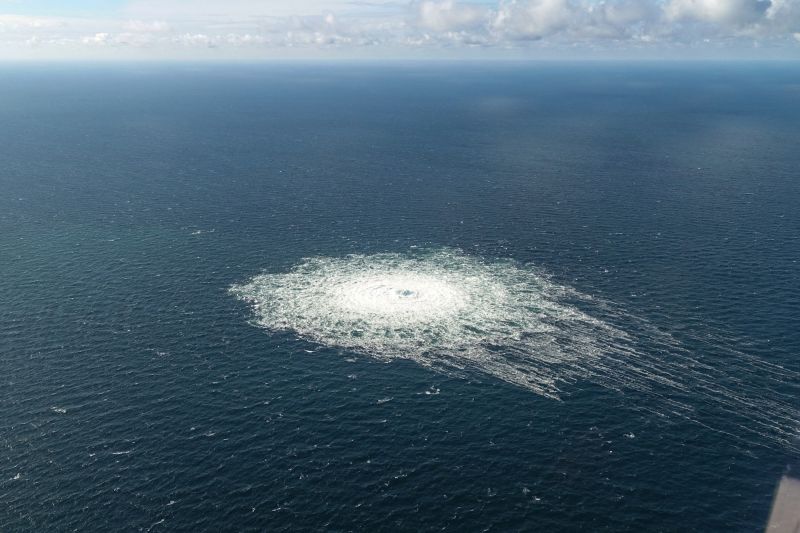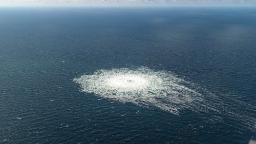

CNN
—
The US and Europe are closing ranks, signaling to Moscow their unity over the war in Ukraine won’t be shattered by what they say is the “sabotage” of dual undersea gas pipelines that could represent a possible new front in energy warfare.
The transatlantic allies have yet to directly blame Russia for what they say are leaks in the pipelines from Russia to Germany that followed underwater explosions. European security officials on Monday and Tuesday observed Russian Navy support ships in the vicinity of the leaks, CNN reported Wednesday, citing two Western intelligence officials and one other source familiar with the matter. But it remains unclear, according to these sources, whether the ships were connected to the explosions, and three US officials said that the US has no thorough explanation yet for what happened, CNN’s Katie Bo Lillis, Natasha Bertrand and Kylie Atwood reported. On Thursday, Germany’s ambassador to the United Kingdom said a fourth leak was discovered and that there was a “very strong indication” these were acts of sabotage.
The leaks have raised suspicions that Russian President Vladimir Putin is moving up to the next notch on his escalatory scale to hike pain on his foes for their support of Ukrainian President Volodymyr Zelensky. If confirmed, Russian attacks on external pipelines would deepen fears that Putin is ready to widen operations outside Ukraine at a time when he is also seeking to scare Western publics with his nuclear rhetoric.
And while Russia has denied involvement in the pipeline leaks, the leaks could emphasize Moscow’s leverage over natural gas markets and raise new fears of shortages and fast rising prices in Europe over the winter as it seeks to fracture Western resolve and support for Ukraine.
The leaks did not immediately cause a crisis since neither pipeline was actually in use. One pipeline, Nord Stream 2, never went online because of sanctions over the war in Ukraine and Nord Stream 1 had been shut down for weeks. Given the conditions at sea, it may take time to assess the damage as gas bubbles to the surface and it could be complicated to ascribe blame.
But if nothing else, the pipeline leaks are a metaphorical severing of an era of post-Cold War US and European energy relations, which left the continent overly reliant on Russian gas exports and prone to geopolitical blackmail. A long estrangement now appears certain at least as long as Putin is in power, which will bring reminders of the Warsaw Pact’s decades-long standoff with the West.
But perhaps to Putin’s disappointment, there was no immediate sign of weakening European resolve. In a fresh sign of solidarity that has surprised some observers, the US and Europe quickly issued similar statements over the pipeline breaches, vowing to investigate and to lessen reliance on Russian energy.
The European Union’s foreign policy chief, Josep Borrell, said the leaks appeared to be a “deliberate act,” comments that were echoed by the Danish and Swedish prime ministers. European Commission President Ursula von der Leyen referred to “sabotage action” in a tweet. US national security adviser Jake Sullivan called the leaks “apparent sabotage” in a tweet on Tuesday night, and US Secretary of State Antony Blinken said there was no sign the leaks would weaken Europe’s energy resistance and that sabotage would be “clearly in no one’s interest.”
Kremlin spokesman Dmitry Peskov dismissed the idea that the Russia might have deliberately sabotaged the pipelines as “predictably stupid,” and Moscow promised its own investigation.
European officials earlier said the leaks were discovered on Monday and that initial investigations showed that powerful underwater explosions occurred before the pipelines burst. CNN reported on Wednesday that the US warned several allies over the summer, including Germany, that the pipelines could be attacked.
The warnings were based on US intelligence assessments, but were vague and did not say who might carry out such action.
The drama over the pipelines came as the war of words between the West and Moscow took another hostile lurch, with Western leaders slamming what they regard as sham referendums in captured Ukrainian territory that Moscow reported resulted in majorities voting to join Russia. It also follows strong warnings from Washington over the weekend that any use by Putin of nuclear weapons in Ukraine would be “catastrophic” for Russia.
Peskov upped the rhetoric from the Russian side, warning that the US was getting “closer to becoming a party” to the conflict in Ukraine. The US has sent billions of dollars in support to Kyiv’s forces with weapons that have caused carnage among Russia’s poorly performing military. But the White House hit back by saying it would not be deterred from supporting Ukraine, announcing a new $1.1 billion package of weapons – including 18 new High-Mobility Artillery Rocket Systems and hundreds of armored vehicles, radars and counter-drone systems.
In another sign of deepening crisis, the United States warned Americans that Russia might try to conscript dual US-Russian citizens for service in Putin’s partial mobilization, which has caused tens of thousands of young men to try to flee the country to avoid being used as cannon fodder in his disastrous war.
Political reverberations are growing from Putin’s warnings last week that he was not bluffing over the possible use of nuclear weapons to defend Russian territory – a threat that caused anxiety given the referendums that could soon lead to the annexation of Ukrainian territory, which could then could come under attack from Kyiv’s forces and potentially trigger the Kremlin.
Some analysts see the warnings as an example of Putin trying to scramble support for Ukraine among the West and to warn the US and its NATO allies off of more strident support for the country. Using a tactical battlefield nuclear weapon would cross a dangerous threshold and mark the first use of an atomic device in warfare since the US dropped two on Japan at the end of World War II. A tactical nuclear weapon has a far smaller footprint than the strategic warheads that Russia and the United States have previously lined up against each other and that could cause a nuclear Armageddon if World War III erupted. But a tactical weapon could still cause major destruction on a scale not seen since Hiroshima and Nagasaki, wiping out large parts of the Ukrainian armed forces and causing nuclear contamination.
The US has no seen indication so far that Russia is moving nuclear weapons around, CNN’s Bertrand and Lillis reported Wednesday. But one theory among some observers is that Putin might use a nuclear blast as a last resort in order to stave off a defeat that could result in his toppling from power in Moscow. Such a battlefield loss has appeared more likely after stunning Ukrainian offensives in recent weeks.
There are many reasons why the use of such weapons might give Putin pause, including the possibility that it could further cement Russia’s isolation from nations like China and India, which have been prepared to defy US attempts to box Putin in economically. The idea that what Putin initially sold to the Russian people as a limited “special operation” in Ukraine could culminate in a nuclear detonation would also raise new questions about his capacity to stave off backlashes inside and outside the Kremlin.
Still, officials are sufficiently worried that Putin has invested so much personal capital in the war that he could not survive a humiliating defeat and might turn to weapons of mass destruction in an attempt to save himself.
And there has been speculation over whether his strategic sense is decaying. French President Emmanuel Macron, for instance, told CNN’s Jake Tapper last week that long periods of isolation during the Covid-19 pandemic might have changed the Russian leader. CIA Director Bill Burns said in an interview with CBS News on Tuesday that Washington was not taking the issue lightly. “We have to take very seriously his kind of threats given everything that is at stake,” Burns said.
Sullivan indicated over the weekend that Washington had sent stern messages through private channels to Moscow warning against the use of nuclear weapons. The administration has not said how it would respond. But it appears to be trying to develop some level of deterrence, and there is speculation that Russia crossing such a threshold would raise pressure for a direct NATO military response and risk the kind of clash and wider escalation of the war that President Joe Biden has painstakingly tried to avoid.
Western officials have spent the 22 years that Putin has been in power seeking to understand his motives and decision making. But no one can read his mind, or know fully how a leader who has built his ruthless rule on an image of strength would react to the possibility of looking weak and having to admit defeat.
That is why Putin is likely to use all of his remaining leverage – from nuclear rhetoric to the possibility of attacks on critical energy infrastructure – and it underscores that the worse the war inside Ukraine goes for him, the more the possibility of escalation grows.
